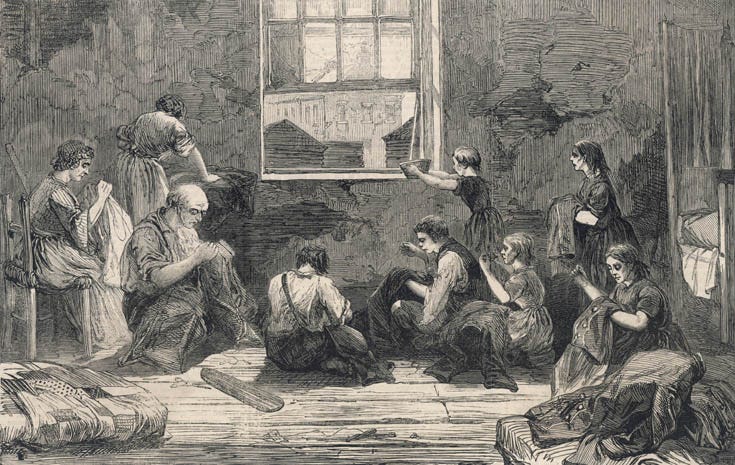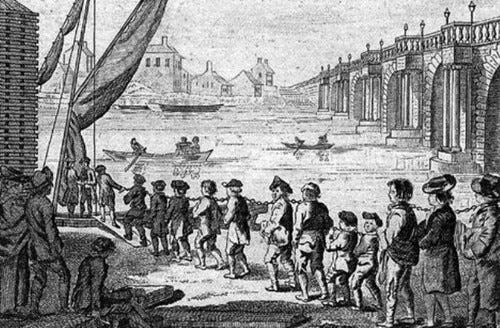How 400 Years of Exploitation Built America's Empire
America was founded on capitalism and the exploitation of people and resources by businessmen from the very start...
Digging my hands into the pungent earth, I couldn't help but marvel at the dramatic difference in soil structure between these three garden beds and the three adjacent ones. From sandy and lifeless to dark and rich—and quite obviously biologically active.
My heart swelled with pride, and I choked back tears of joy. This moment made every wheelbarrow of muck hauled from the sheep shed worth it. All of the back-breaking labor that comes with committing to no-till farming had led to this, and I am overwhelmed with gratitude for this farmish life I get to live.
Welcome to the latest Updates From the Farm! If you are new here, I invite you to check out my About page to learn what this is, who I am and why I am doing this. Or just dive right in! At “Runamuk Acres” you’ll find the recantings of one lady-farmer and tree-hugging activist from the western mountains of Maine. #foodieswanted
In This Post:
The Pattern Emerges
Men In Suits
The Foundation of Empire
Historical Timeline: The Architecture of Control
The Revolution We Need
The Man in the Mirror
I sank my hands deeper into the soil and reveled in the transformation that happens not just in the soil, but in our entire understanding of what it means to work with the land rather than against it. It's a quiet revolution that begins right beneath our feet.
The Pattern Emerges
I've been thinking about revolutions a lot these last couple weeks.
Research for my review of Jim Merkel's film "Saving Walden's World" led me down a rabbit hole into the recent revolutions within the countries of Kerala, Cuba and Slovenia. Each of these countries experienced a peasant-uprising and came out on the other side as leaders on the path to a more sustainable existence.
Twenty years ago, as a young mom new to homeschooling, I did extensive research into American education history. I began to understand that the stories went much deeper than our textbooks portrayed when I stumbled upon John Taylor Gatto's work.
"Basically, our modern school system was borne out of Prussia during the time period of ideas of superior races and experimentation in controlling the masses. It's been structured so as to train the people into subservience, making us indifferent, lacking curiosity and uninspired."
When I sat down to watch Jim Merkel's film, I already knew that our current society had been engineered to exploit the working class. The thought of the United States' long history of fabricated wars makes me cringe, though I did not realize the full extent of our crimes against humanity until I watched this film.
Read my review of “Saving Walden’s World”…
It's Time to Stop Pretending America is the Hero
What if America's heroic self-image exists only to justify exploitation while keeping its citizens complacent? Why does a country that claims to champion human rights continue to prioritize profit over people?
Men in Suits
This one piece of Jim's film has stuck with me:
"Who starts wars?
Men in suits.Who decides about politics and strategies?
Mainly men in suits."
Then, I read Paul Cudenec's "The Invisible College and the Plan for Our Enslavement," which led me to dig deeper. It's a controversial topic, but highly likely that key historical figures like Francis Bacon, René Descartes, and Isaac Newton—along with the Royal Society—all played a part in a systematic social engineering project dating as far back as the 1500s.
What's more—thanks to research I've done for a historical farm-smut book I want to write—I've learned that indentured servants were a huge market between the 1630s and the 1800s. In fact, it wasn't even outlawed until 1917.
During that time period, men in suits exploited the Transportation Act of 1718 to enrich themselves. Some indentured servants' only "crime" was being poor.
In Europe, this systematic removal of the poor created a more compliant domestic population while providing cheap colonial labor for American endeavors. All of which fit perfectly with the mechanistic, profit-oriented worldview being promoted by the "scientific" revolution figures.
In America, the indentured servant system allowed those with initial capital to leverage human beings as both labor and land acquisition tools, creating massive estates that became the foundation of American plantation wealth and later, a slave-based economy. The systematic exploitation extended to Native Americans and natural resources, establishing patterns of extraction that persist today.
An oligarchy of wealthy families, known as the 'First Families of Virginia,' evolved in the late 1600s and displayed their wealth by constructing brick mansions. This pattern established an early template for the same concentration of power and ostentatious displays of wealth that characterize modern oligarchs facing public outcry today.
In America, the indentured servant system allowed those with initial capital to leverage human beings as both labor and land acquisition tools, creating massive estates that became the foundation of American plantation wealth and later, a slave-based economy. The systematic exploitation extended to Native Americans and natural resources, establishing patterns of extraction that persist today.
The Foundation of Empire
Connecting the dots, you can see how America was founded on capitalism and the exploitation of people and resources by businessmen—"men in suits"—from the very start. But they didn't stop there.
Under the guise of "bringing democracy to poor and war-torn countries," these men in suits pursued their business interests by infiltrating the United States government, and over the years we've engaged in countless wars for the sake of corporate profits.
The Guatemalan conflict of 1954, Nicaragua in the 80s, Honduras, Panama, Chile and Cuba were all classified as "low-intensity conflicts" (LIC). In his film, Jim Merkel reveals that just during his own short stint working for the government, the United States was engaged in at least 50 such small wars.
While the Constitution gives Congress the power to declare war, presidents have successfully argued that many LIC operations fall below the threshold requiring congressional authorization. This has created a significant loophole that allows extensive military operations without democratic oversight.
"The mythology of the US as the hero is a cover story for corporate interests and the elite capture of public resources. The promise of democracy has long justified war, disguising our efforts to destabilize countries so US companies could access cheap land and labor."
Historical Timeline: The Architecture of Control
The Philosophical Foundation (1561-1660)
Francis Bacon advocated for the systematic domination of nature through knowledge
René Descartes developed his method of systematic doubt and mind-body dualism
The Royal Society organized efforts to promote "mechanical philosophy"
The Labor System (1607-1917)
1607: Virginia Company began using indentured servants to populate Jamestown
1718: Transportation Act formalized the transportation of felons for forced labor
1775-1783: American Revolution used indentured servants as military recruits
1861-1865: Civil War fought over the slavery system that replaced indentured servitude
The Military Machine (1865-Present)
Post-Civil War: Expansion into Mexico, Cuba, Philippines, China
"Banana Wars" Era (1898-1934): Systematic interventions to protect business interests
Cold War and Beyond: Guatemala, Cuba, Dominican Republic, Chile, Grenada, Panama, Iraq, Afghanistan, Libya, Syria
"Color Revolutions": Serbia, Georgia, Ukraine, Kyrgyzstan—and ongoing operations in Yemen, Pakistan, Somalia

The Revolution We Need
As I kneel in my garden, hands deep in living soil, I see the truth that the men in suits have tried to obscure for centuries: real revolution doesn't come from above, from boardrooms or battlefields.
It comes from below—from the ground up.
The same mechanical worldview that promoted dominating nature has been used to dominate people—treating soil as dead dirt to be chemically manipulated, workers as resources to be exploited, and nations as markets to be captured through force.
But soil is not dead. People are not resources. And we are not powerless.
Jim Merkel's "Saving Walden's World" reveals that the revolution I witnessed in my garden beds has already happened on a national scale. Kerala, Cuba, and Slovenia prove that another way is not only possible—it's thriving.
Each chose revolution—demanding land reform, education, healthcare, women's equality, and sustainability. Each emerged as global leaders in the sustainability movement. Kerala empowered women through microfinancing and democratic decentralization. Cuba became the most sustainable place on Earth through organic agriculture and universal healthcare. Slovenia became the world's first entirely Green Destination through publicly funded social services.
Meanwhile, America continues serving corporate interests while our communities struggle without universal healthcare, affordable education, or food security.
The Man in the Mirror
The blueprint exists. The examples are thriving. The soil is ready.
Revolution begins with the man in the mirror. For my part, I'm assessing my own existence to determine how I might live more simply—reducing consumption, choosing repair over replacement, prioritizing community over convenience.
I want to challenge myself to live more like the Keralans, Cubans, and Slovenians who've proven prosperity doesn't require endless accumulation.
This isn't just personal reflection—it's a challenge I'm extending to anyone willing to join. What if we collectively chose radical simplicity over radical consumption? What if we measured wealth not by what we own but by the health of our soil, the strength of our communities, the sustainability of our practices?
But personal transformation alone isn't enough. We must demand the political reforms that enabled their success: breaking up corporate monopolies, establishing universal healthcare and education, creating pathways to land ownership, and prioritizing ecological health over quarterly earnings.
This is the revolution that matters: ordinary people choosing radical simplicity while organizing for political reforms that make such choices viable for entire communities. We plant gardens and fight for food sovereignty. We repair instead of replace and demand right-to-repair legislation. We share instead of hoard and advocate for cooperative economics.
The Keralans, Cubans, and Slovenians didn't wait for permission to live differently. They fought the political battles necessary to create systems supporting their values.
The revolution starts in the mirror, spreads to the garden, grows into political action, and transforms the world we want to leave behind.
I'm ready to take on this challenge of radical simplicity. Who will join me?
The earth knows the difference between death and life. So do we. The revolution isn't just underway—it's already succeeded in places brave enough to choose people over profit. Now it's our turn.
Check back soon for more about how we can embrace radical simplicity and spark the revolution we need in America and overcome the men in suits who have dominated us for so long.
No matter how you subscribe, I thank you for reading.
Sending love and good juju to you and yours.
Your friendly neighborhood farmer,
Sam
Thank you for following along with the story of this lady-farmer! It is truly a privilege to live this life serving my family and community, and protecting wildlife through agricultural conservation. If you found this post valuable, please consider Restacking so more people can see it!




Good one. In short, they diminish and reduce farmers because they are so important. They are a viable threat to the elite.
From what I understand the anarchists were born out of farmers.